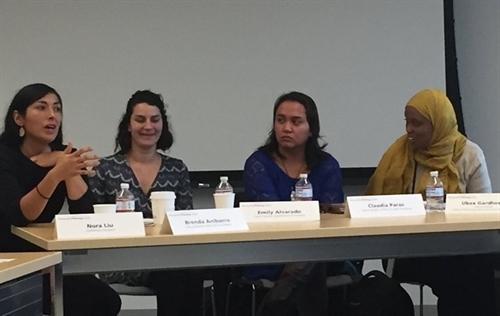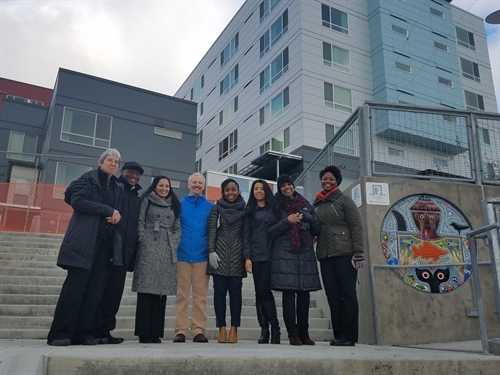What unique interventions in Seattle taught MPC and partners about addressing disparities

The Chicago delegation tours Greenbridge development with King County Housing Authority Executive Director Stephen Norman
Question: How do communities across America reduce segregation and promote equity? Answer: MPC’s Cost of Segregation team and partners are on the case. From Chicagoland to farther-flung destinations, the past six months brought us new insights as we shape recommendations for a more inclusive and equitable region as part of our study on the Cost of Segregation.
An 18-member delegation from Chicago comprised of city and county officials, community-based organizations and philanthropic partners visited Seattle from November 15 – 17th. When our local research prompted us to explore best practices from other regions, Seattle stood out because the local government is a critical player in addressing racial disparity and structural causes of inequity using policy as a tool to embed more equitable practices within their structures.

City of Seattle Equity Initiatives Panel: Brenda Anibarro, Emily Alvarado, Claudia Paras and Ubax Gardheere
Launched in 2004, the Seattle Race and Social Justice Initiative (RSJI) is a citywide effort to end institutionalized racism and race-based disparities in City government. RSJI includes a multi-year strategic plan that prioritizes government departments to work with community and institutional partners on racial equity across a range of areas including education, housing and criminal justice. In 2014, the city passed an ordinance expanding RSJI requiring all city department to conduct equity assessments of their work outcomes and internal practices. These assessment have been instrumental to guiding equitable decision making practices and creating measures for accountability. Similarly, King County government launched their Equity and Social Justice Initiative in 2008 which was formalized by ordinance 2010. King County’s plan includes 14 determinants of equity and over 60 indicators to measure progress towards a fair and equitable community.
During the two-day learning trip the delegation met with a wide range of local professionals engaged in equity-focused work which included the City of Seattle, The Seattle Police Commission, King County, The Seattle Foundation, The Government Alliance on Race and Equity, Rainer Beach Action Coalition and other community partners. Topics included housing and equitable development, applying racial equity tools across government, building community voice and power through philanthropic investments and cultivating authentic partnerships and joint decision making with communities that have been historically excluded. The delegation also toured Yesler Terrace, a redevelopment effort led by the Seattle Housing Authority and Yesler Community Collaborative and Greenbridge, a mixed-income, mixed-use development in southern King County led by the King County Housing Authority. Both sites provided different perspectives on the region’s intense growth and housing and displacement challenges and targeted efforts to preserve affordability, respect indigenous community culture and build economic opportunity through entrepreneurship.

Stephanie Van Dyke with the Seattle Housing Authority shows off the art installations at Yesler Terrace
Additionally, the region has added credibility to their efforts by devoting resources investing in community capacity building focused on racial equity. The Seattle Office of Civil Rights administers the Racial Equity Fund which granted $75,000 to grassroots organizations in 2016. King County is partnering with the Seattle Foundation on Communities of Opportunity (COO). In 2016 COO which invested over $1 million in place-based initiatives to improve health, racial, social and economic outcomes with a focus on policy and systems change.
Here are a few reflections from delegation members.
“Seattle by default used economic integration as a way of addressing racial integration and was able to achieve a 96% mandate. We may be able to approach our racial segregation challenges from the same angle.”
“Most valuable was learning about the policies and structures created to begin this work. This gives us a roadmap of possibilities to implement.”
“This trip exceeded my expectations with the diversity of voices and informed opinions in how Seattle has developed the way it has. I gained a new understanding and human perspective about the relationships and personal development that happened to get the right individuals into key roles in government.”
MPC continues to reflect on lessons learned and what may be applicable to Chicago and those insights will inform our policy recommendations for the next phase of the Cost of Segregation study. As national leaders prepare to convene in our city in April for the Equity Summit, we are excited that local voices will help shape the conversation on equity for our nation and hopeful that Chicago will emerge as a front runner as we work to create inclusive and equitable communities.
The learning expeditions to Seattle and Atlanta were made possible through the generous support of the Annie E. Casey Foundation, Enterprise Community Partners and the Ford Foundation.
Learn more about MPC's Cost of Segregation-related research trips to Seattle and Atlanta:
"Data Points: Allied, not sleepless, in Seattle" by Alden Loury
"What I learned in Atlanta about equity and inclusion" by Lynnette McRae